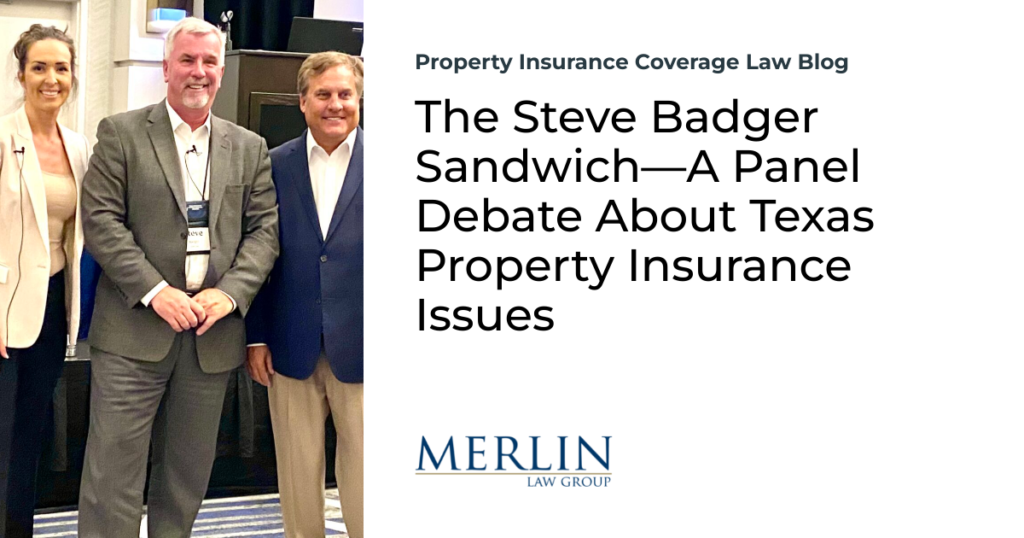The Steve Badger Sandwich—A Panel Debate About Texas Property Insurance Issues

Spicy! That was the first comment from an audience member after Rene Sigman and I badgered Steve Badger in a panel discussion of significant property insurance adjustment issues in Texas.
In my view, Steve Badger did an excellent job—but there were some significant differences of opinion between his view and those Rene Sigman and I share. For the public adjusters in the audience, many suffered and agonized through some of the hard issues.
Here are some of the issues we tackled:
Caps on public adjuster fees.
Fraudulent estimates
Managed Repair
Unauthorized Practice of Public Adjusting
Contractors, experts and vendors acting as adjusters.
Appraisal
Depreciation of Labor
Settlement at RCV and the Public Adjuster Fee
Proving Date of Loss and Concurrent Causation
Attorneys Competing With Public Adjusters
Raising The Bar To Become A Property Insurance Adjuster
The one thing which seemed to be agreed upon was the call for public adjusters to raise the bar for licensing. Insurance adjusting involves the public trust, and Steve Badger went so far as to say that insurance companies and independent adjusters in Texas should have a higher bar for licensing as well.
Property insurance adjusting is very important work. It is not easy work and involves so many technical areas of expertise for one to be really good at property adjusting. Property insurance adjusters must fully understand policy language, relevant statutes, regulations, and common law. It calls for understanding the construction and value estimating of numerous property types. The attention to fine detail as well as considerable interpersonal skillsets are needed characteristics of good property insurance adjusters. Those doing adjustment work have to be people of high character. It is not an easy trade to do properly. I have a lot of respect for those that try their best in this field. I am certain Rene Sigman and Steve Badger feel the same.
Some major issues raised the audience’s ire and should not have been such contentious topics. For example, when Steve Badger was describing the practice of some public adjusters or contractors having two sets of estimates—one higher for the insurance company and a lower one for the policyholder once the insurance company was duped into believing the higher estimate—the room had a small eruption because many took it that Steve was accusing everybody in the room of doing this. Of course, everybody agreed that this was not right and an unethical practice. But the heated response by some in the audience was as if Badger was accusing them of committing fraud.
One of my notes reflected an agreement from Steve Badger that the preferred contractor of the insurance company should not be adjusting the loss. Indeed, Badger mentioned that third-party vendors and experts should not replace the role of the property insurance adjusters and especially should not be deciding what is not to be paid.
For Texas public adjusters, the issue of how much can be charged was a topic of concern. My blog post, Are Texas Public Adjuster Contracts in Jeopardy? Don’t Miss the Panel Discussion at TAPIA’s Spring Conference!, highlighted that we would discuss the issue.
Badger cleverly had me explain the ruling and that the Texas Department of Insurance (TDI) apparently disagrees that public adjusters can collect more than 10% on any adjusted amount. In other words, what is commonly done is for public adjusters to charge a percentage higher on collected amounts when they are brought into a claim after payments have been made, so long as the amount charged as a fee is not more than 10% of the total paid claim. The TDI has ruled this to be sanctionable. I had to explain this to the audience and warn them that they could be sanctioned for doing so, based on the recent findings mentioned in my prior blog post. We have to follow the law and the ruling of those enforcing laws.
The bottom-line lesson from this event is that it is important for advocates of policyholders to consider the views of their counterparts in the insurance industry. Rene Sigman noted how much law and adjustment practices have changed since she first started in this business over 20 years ago. Her perception is well taken, and the lesson is that nothing ever stays the same.
Insurance companies may desire to change how their products work, what is covered, and how adjustments are processed. Accepting those changes and whether those changes are legal can certainly cause significant debate. It makes property insurance adjustment and law much more dynamic than what it was a decade ago and much more dynamic than when I started over forty years ago.
I thoroughly enjoyed the debate. I felt it was a very tough crowd for Badger. This time around, I had a friend, Rene Sigman, who was more than capable to help me. Still, I learned a lot listening to Steve and then learned from the questions posed by the audience.
If you ever have a chance to watch and learn from Steve Badger or Rene Sigman, you should not miss it. It was even better yesterday because of the audience questions and participation.
Thought For The Day
Tell me and I forget. Teach me and I remember. Involve me and I learn.
—Benjamin Franklin







